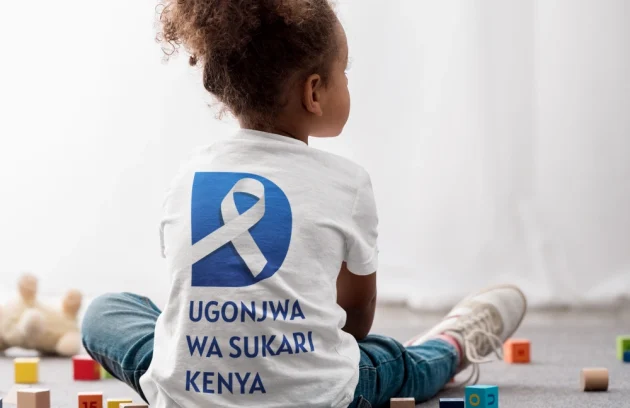- September 26, 2024
- Diabetes Kenya
- Comment: 0
- Children and diabetes
Talking to Your Teenager About Diabetes: Navigating the Teenage Years with Type 1 Diabetes in Kenya
As your child becomes a teenager, they will naturally start wanting more control over their life, and managing diabetes becomes part of that transition. Many parents worry that their teenager may not manage their diabetes as carefully as they would, leading to potential health complications. It’s essential to recognize that navigating diabetes during the teenage years comes with unique challenges, but with open communication, support, and education, these can be managed effectively.
How to Communicate with Your Teenager About Diabetes
Teenagers with diabetes will still behave like any other teens, but there are specific considerations that make clear communication especially vital. Here are some tips for effectively discussing diabetes management with your teen:

Pick the Right Time
Don’t start a serious conversation when either of you is in a rush. Choose a time when you can both talk without interruptions.

Stay Calm
Discuss issues, such as alcohol or diet choices, calmly. Waiting until you are no longer angry about a specific incident will lead to more constructive discussions.

Address One Issue at a Time
If you have concerns about multiple behaviors, prioritize discussing the most pressing issue first. Tackling everything at once can overwhelm your teen.

Casual Conversations Can Be Better
Face-to-face conversations may be daunting for teens. Try bringing up sensitive topics during casual activities like cooking or walking.

Involve Trusted Adults
If your teen is more comfortable speaking to a trusted relative or family friend, allow that, but ensure you remain in the loop about critical aspects of their diabetes management.
Navigating Teenage Love and Relationships with Diabetes
When discussing relationships with your teen, diabetes must also be considered. It’s important they understand the impact diabetes can have on their bodies in relation to intimacy:
- Sex and Hypoglycemia: Remind your teen that physical activity, including intimate relationships, can lead to hypoglycemia. Encourage them to keep snacks nearby.
- Genital Health: High blood sugar levels can lead to infections like thrush, so it’s crucial to manage their diabetes well to avoid discomfort.
- Contraception: If your teen is considering sexual activity, ensure they understand the importance of using contraception. Girls with diabetes can take contraceptives, but it’s essential they use some form of protection unless they are planning for pregnancy.
Alcohol and Diabetes: What Teens Should Know
Teens with diabetes can consume alcohol in moderation, but too much alcohol increases the risk of hypoglycemia. Teach your teenager how to manage drinking responsibly:
- Never Drink on an Empty Stomach: Make sure they eat before heading out or keep snacks handy when drinking.
- Tell Friends About Diabetes: It's vital that friends know about their condition and how to treat a hypo in case of an emergency.
- Carry Diabetes ID: A hypo can be mistaken for drunkenness. Wearing diabetes ID can help avoid misunderstandings.
- Alternate Drinks: Encourage drinking water or sugar-free beverages in between alcoholic drinks to stay hydrated and reduce the risk of hypoglycemia.
- Late-Night Hypos: Alcohol stays in the system for a while, so a hypo may occur several hours later. After a night out, they should eat something before bed.
Drugs and Diabetes: The Dangers
Discuss the dangers of both legal (alcohol, nicotine) and illegal drugs with your teen. Drugs affect people and their diabetes differently depending on the type and amount used:
- Cannabis and Hypoglycemia: Cannabis can lead to relaxation and munchies, which may spike blood sugar, but it can also make your teen forget to take insulin.
- Hallucinogens and Insulin: Drugs like LSD can make people forget critical tasks like insulin injections.
- Uppers and Dehydration: Club drugs like ecstasy can cause dehydration, which is dangerous when mixed with strenuous dancing or low insulin.
Smoking and Diabetes: The Risks
Smoking increases the risks of heart and lung disease, and people with diabetes who smoke are at twice the risk of developing heart disease as those who don’t:
- Impact on Health: Smoking can affect fertility and increase complications during pregnancy.
- Aesthetic Effects: Teens may be deterred by the idea that smoking can stain teeth and negatively impact their appearance.
Tips for Parents of Teens with Diabetes

Be a Supportive Ally
Let your teenager know that you are always there for support. Encourage them to take responsibility but provide guidance where necessary.

Clinic Appointments
Help your teenager keep up with their healthcare appointments and encourage them to be open with their medical team.

Stay Positive
Praise the good decisions your teenager makes, whether it’s sticking to their medication or managing their diet well.

Encourage Connections
Help them connect with other teens who have diabetes so they can share experiences and feel less alone in their journey.
By fostering an open, understanding environment, parents can help their teens manage their diabetes effectively while navigating the challenges of adolescence.
Talking to Your Teenager: Top Tips
Conclusion
Raising a teenager with diabetes can be challenging, but with the right communication and support strategies, parents can help their teens manage both their condition and the ups and downs of adolescence. Encourage your teen to stay on top of their diabetes management while also enjoying a full and active teenage life.

Their Reaction
CHILDREN AND DIABETES Type 1 Diabetes in Children: How Your Child May React to Their Diagnosis For children…



